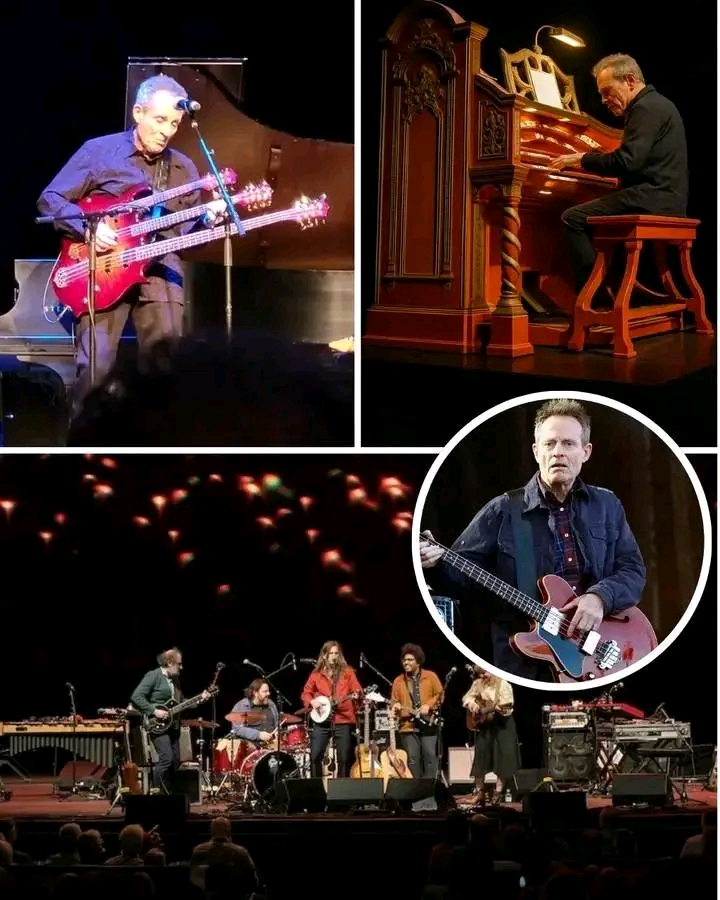Legendary bassist John Paul Jones brought the spirit of Led Zeppelin roaring back to life at the Big Ears Festival in Knoxville! In a breathtaking performance that felt like a séance of rock history, Jones seamlessly switched from pipe organ to mandolin, piano to lap steel guitar—each transition met with awe. Classics like “Your Time Is Gonna Come,” “No Quarter,” and “Going to California” unfolded with haunting power and fresh intensity. The crowd was spellbound, witnessing not just nostalgia but reinvention. Jones didn’t just revisit Zeppelin—he reimagined it, reminding the world that his musical fire burns brighter than ever. It was more than a set; it was a masterclass in timeless artistry….. watch video
At the recent Big Ears Festival in Knoxville, Tennessee, music fans were treated to an extraordinary event that will be etched into the annals of live performance history. Legendary bassist and musical innovator John Paul Jones, forever celebrated as the backbone of Led Zeppelin, delivered a spellbinding set that reawakened the spirit of rock’s most iconic band in a way that felt both reverent and revolutionary. The atmosphere was electric, the audience spellbound, as Jones took them on a transcendent journey through the depths of classic rock, reimagined with his signature artistry and improvisational genius.
From the moment Jones stepped onto the stage, it was clear that this was no ordinary reunion or nostalgia act. Instead, it was a masterclass in musical storytelling, blending history with innovation. Jones, now in his late seventies but still radiating creative vitality, seamlessly transitioned between instruments and sounds—each change met with awe and admiration from the crowd. He wielded a pipe organ with majestic authority, plucked a mandolin with delicate finesse, played the piano with haunting resonance, and even picked up a lap steel guitar, each instrument adding a new layer to the unfolding sonic tapestry. This fluidity underscored his mastery and deep understanding of his craft, transforming the stage into a séance of rock history.
The setlist was a thoughtfully curated journey through Led Zeppelin classics, but with a fresh perspective that invigorated their timeless melodies. Jones began with “Your Time Is Gonna Come,” a song that immediately set the tone—haunting, soulful, and imbued with a reimagined intensity. His bass lines carried a new weight, echoing the song’s bluesy roots while infusing it with a modern vibrancy that felt both nostalgic and urgent. As he transitioned into “No Quarter,” the atmosphere grew even more ethereal. The haunting Mellotron sounds and Jones’s layered keyboard work created a sonic landscape that seemed to open a portal to another realm—an otherworldly séance where music became a conduit for spirits of the past.
Throughout the night, Jones’s performance was marked by a fearless willingness to explore new sonic territory. On “Going to California,” he brought out the mandolin, weaving delicate melodies that floated over the audience like shimmering threads of sound. The song’s introspective beauty was amplified by his nuanced playing, each note resonating with heartfelt emotion. Later, with the lap steel guitar, he added a touch of country-blues grit to “Kashmir,” transforming the epic into a soulful, rootsy voyage. Each transition was met with gasps and applause, as the crowd realized they were witnessing not just a tribute, but a reinvention—an artist breathing new life into sacred material.
What made this performance truly extraordinary was Jones’s ability to connect past and present seamlessly. He didn’t simply replicate Zeppelin’s hits; he reinterpreted them, emphasizing their emotional core while exploring fresh improvisations and arrangements. The audience was swept up in a wave of musical discovery—each song felt like a revelation, a glimpse into the infinite possibilities of sound. The haunting power of “Your Time Is Gonna Come” lingered long after the notes faded, and “No Quarter” unfolded with a depth that seemed to reach into the very soul of the listener.
The visual aspect of the performance also played a crucial role. Jones’s stage setup was minimal but evocative, with subtle lighting that shifted in tandem with the music’s mood. His expressive face and commanding presence conveyed a deep reverence for the material and a passion that transcended age. Every note he played seemed imbued with a sense of purpose—a reminder that his musical fire remains as fierce as ever.
Perhaps most striking was the sense of communion that permeated the entire set. It was as if Jones had summoned the ghosts of Zeppelin’s past, inviting them to join him in a spirited séance of sound. The audience felt this too—there was a palpable sense of reverence, wonder, and gratitude. Fans who had grown up worshiping Led Zeppelin found themselves transported back to their youth, yet also experiencing the music anew—fresh, vital, and alive.
The performance was more than just a nostalgic trip; it was a testament to Jones’s enduring creativity and his role as a musical innovator. His ability to reimagine Led Zeppelin’s catalogue with fresh arrangements, improvisations, and instrumental mastery proved that the band’s legacy is not static but a living, breathing entity capable of continual reinvention. This set reaffirmed the importance of musical evolution and the power of legendary artists to shape and reshape their art across decades.
As the final notes echoed into the Knoxville night, the crowd erupted into thunderous applause—a collective acknowledgment of a once-in-a-lifetime experience. Many attendees felt as if they had witnessed something transcendent, a rare moment where history, artistry, and innovation collided to create pure magic. Jones’s performance was a masterclass in timeless artistry, demonstrating that even after fifty years, the spirit of Led Zeppelin roars on, fueled by a musician whose fire burns brighter than ever.
For those fortunate enough to witness it, this Big Ears performance will remain a defining memory—a shining example of how true artistry can honor the past while boldly forging into the future. John Paul Jones didn’t just revisit Led Zeppelin; he reimagined it, reminding the world that his musical fire is still ablaze, lighting the way for generations to come.
